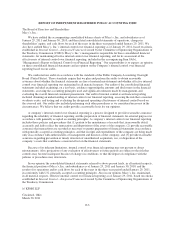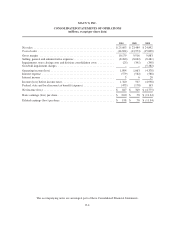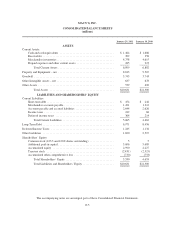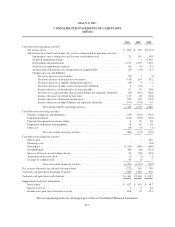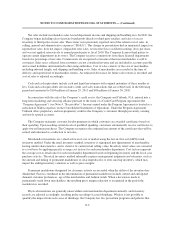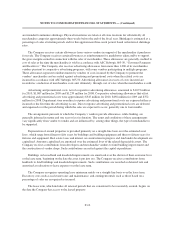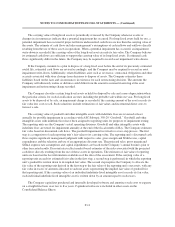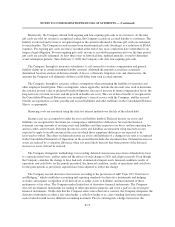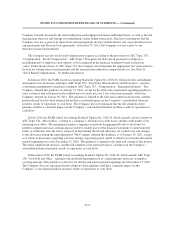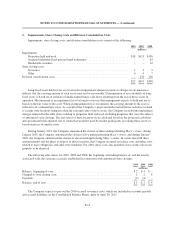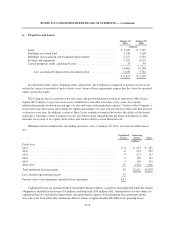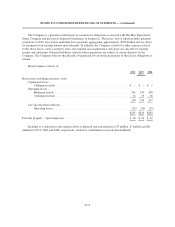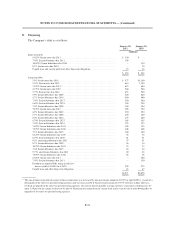Macy's 2010 Annual Report Download - page 61
Download and view the complete annual report
Please find page 61 of the 2010 Macy's annual report below. You can navigate through the pages in the report by either clicking on the pages listed below, or by using the keyword search tool below to find specific information within the annual report.
NOTES TO CONSOLIDATED FINANCIAL STATEMENTS — (Continued)
Company formally documents the relationship between hedging instruments and hedged items, as well as the risk
management objective and strategy for undertaking various hedge transactions. Derivative instruments that the
Company may use as part of its interest rate risk management strategy include interest rate swap and interest rate
cap agreements and Treasury lock agreements. At January 29, 2011, the Company was not a party to any
derivative financial instruments.
The Company records stock-based compensation expense according to the provisions of ASC Topic 718,
“Compensation – Stock Compensation.” ASC Topic 718 requires all share-based payments to employees,
including grants of employee stock options, to be recognized in the financial statements based on their fair
values. Under the provisions of ASC Topic 718, the Company must determine the appropriate fair value model to
be used for valuing share-based payments and the amortization method for compensation cost. See Note 13,
“Stock Based Compensation,” for further information.
In January 2010, the FASB issued Accounting Standards Update No. 2010-06, which provides amendments
and requires new disclosures relating to ASC Topic 820, “Fair Value Measurements and Disclosures,” and also
conforming amendments to guidance relating to ASC Topic 715, “Compensation – Retirement Benefits.” The
Company adopted this guidance on January 31, 2010, except for the disclosure requirement regarding purchases,
sales, issuances and settlements in the rollforward of activity in Level 3 fair value measurements, which the
Company adopted on January 30, 2011. This guidance is limited to the form and content of disclosures, and the
portion thereof that has been adopted did not have a material impact on the Company’s consolidated financial
position, results of operations or cash flows. The Company does not anticipate that the full adoption of this
guidance will have a material impact on the Company’s consolidated financial position, results of operations or
cash flows.
In July 2010, the FASB issued Accounting Standard Update No. 2010-20, which amends various sections of
ASC Topic 310, “Receivables,” relating to a company’s allowance for credit losses and the credit quality of its
financing receivables. The amendment requires companies to provide disaggregated levels of disclosure by
portfolio segment and class of financing receivable to enable users of the financial statements to understand the
nature of credit risk, how the risk is analyzed in determining the related allowance for credit losses and changes
to the allowance during the reporting period. The Company adopted this guidance as of January 29, 2011, except
as it relates to disclosures regarding activities during a reporting period, which is effective for interim and annual
periods beginning on or after December 31, 2010. This guidance is limited to the form and content of disclosures.
The initial adoption did not have, and the full adoption is not expected to have, an impact on the Company’s
consolidated financial position, results of operations or cash flows.
In December 2010, the FASB issued Accounting Standard Update No. 2010-28, which amends ASC Topic
350, “Goodwill and Other,” relating to the goodwill impairment test of a reporting unit with zero or negative
carrying amounts. This guidance is effective for interim and annual periods beginning after December 15, 2010.
The Company does not anticipate that the adoption of this guidance will have a material impact on the
Company’s consolidated financial position, results of operations or cash flows.
F-13


